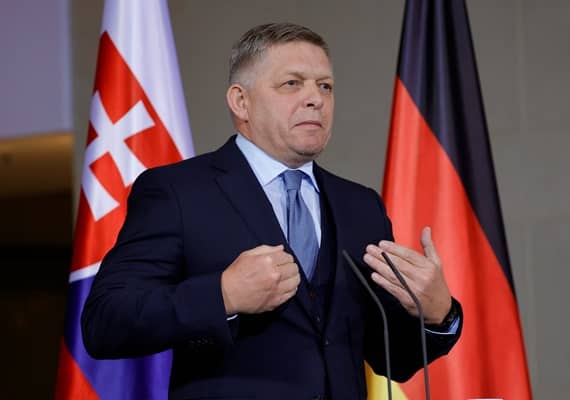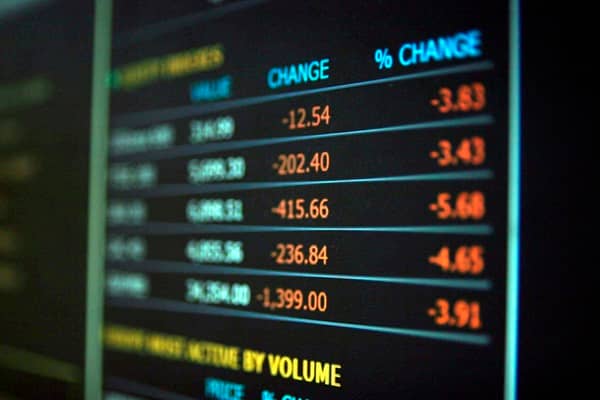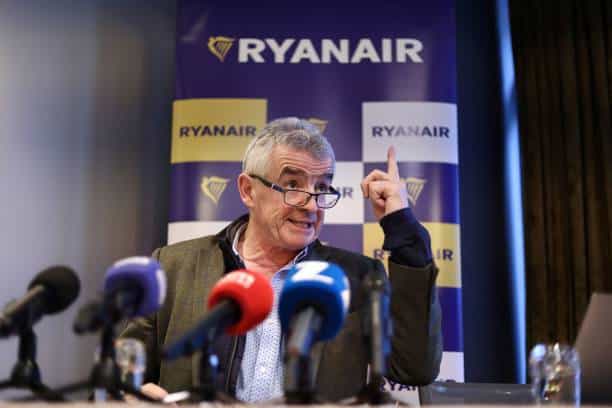People like to spend time here. There is a positive messaging for the [commercial] tenants, who want people to come to the office. Bringing them to Battersea Power Station is an easy sell
Jobs
Corkman leading €11bn development of Battersea Power Station in London: ‘We’ve created a place to live, work and play’

Meeting rooms at the offices of Battersea Power Station Development Company are named after movies filmed at the £9 billion (€10.9 billion) development’s iconic riverside site in London. Its Cork-born chief executive Donagh O’Sullivan – staff call him Don – leads us down a corridor.
As he strides purposefully past a few rooms, I make a quip to the high-flying Irish executive that sounds just a touch on-the-nose: are we not stopping to do your interview in Superman III? “Ha, no,” says O’Sullivan. “In here.”
We take our seats at a table in The King’s Speech meeting room. The power station’s old control room was used in the 2010 Oscar-winning historical drama, where it was a BBC wireless control room for a speech by the stuttering wartime royal.
Life is about to imitate art. The day after our interview, Britain’s current king, Charles, is due to visit Battersea Power Station with Apple chief executive Tim Cook and London R&B singer Raye, who had a viral hit with her relentless earworm Escapism).
The king isn’t doing a speech this time, or not exactly. But he is due to visit a craft stalls market in one of the grand retail concourses within the cavernous old power station beneath its instantly recognisable four chimneys. The building looms over the south bank of the river Thames across the water from Chelsea.
“Today, we’re showing around The Irish Times. Tomorrow, it’s King Charles,” says O’Sullivan with a chuckle.
He notes that the king “has a big passion for arts and crafts, and the small business part of the economy”. In Cook, he also has a companion who runs the world’s biggest company by market cap. Apple’s UK headquarters is the glitzy anchor office tenant of the sprawling Battersea scheme, which, once completed, will be home to 250 retail outlets, approximately 4,000 homes, 19 acres of public realm, hotels and entertainment spaces.
This eclectic visiting party – the king, the capitalist and the songstress – is due to be welcomed by the son of small business owners from the village of Cullen near Millstreet in north Cork. O’Sullivan, the former chief executive of housebuilder Galliard Homes, took over as Battersea’s boss during the summer, six months ago this week.
The Corkman is understated and softly-spoken, but you sense a steely side beneath his calm veneer. Unlike the stereotype of his county compatriots, he is not a garrulous gabber. He chooses his words carefully and, although friendly, says no more than he needs to and rarely strays off message.
Decommissioned in 1983, the old power station was first pencilled in for a big development incorporating an indoor theme park that fell through in the late 1980s. Then Hong Kong developer Parkview International tried and failed to redevelop it in the 1990s. In 2006, as the Celtic Tiger reached a frothy crescendo, a company controlled by Irish developers Johnny Ronan and Richard Barrett swept in to buy it for £400 million. They hired the world-renowned architect Rafael Viñoly to develop a master plan. But just as it had broken others before them, Battersea proved too big for Ronan and Barrett to handle. The crash also didn’t help.
There was a dead-end flirtation with the then-owner of Chelsea FC, Russian tycoon Roman Abramovich, who wanted to build a new stadium for the club beneath the four chimneys. Then the Irish developers’ senior lenders, the State’s National Asset Management Agency (Nama) and financial giant Lloyds, called in its debts and it was put into administration in 2011.
It was soon bought by a consortium of Malaysian investors. Its owners include property companies SP Setia Berhad and Sime Darby Property, as well as the Asian country’s Employees Provident Fund and investment outfit Permodalan Nasional Berhad. They have stuck broadly to Viñoly’s masterplan.
“There is a very short list of capital backers that would be able to take on something this long-term,” says O’Sullivan, who runs the two-and-a-bit out of eight phases of the scheme built so far. He will also lead the development of the rest of the site, beginning with the C part of phase three. All remaining work will be beyond the power station building footprint.
“Our shareholders bought in 2012. We’re 12 years in and it’s half-done. There are probably another 10-15 years in the project. For 30 years, there were four failed versions of companies that tried to deliver it. It took somebody with the depth of patience of our shareholders to make it happen.”
The vast scale of the planned development on the 42-acre surrounding site is apparent as O’Sullivan leads a tour. We start at Electric Boulevard, a retail thoroughfare built in the latest phase. It runs from near the Tube station of the new Northern Line spur, and leads to the back of the brick-built power station building, which opened in 2022 in the second phase.
O’Sullivan takes us through a special “director’s entrance” that was used by the management of the old power station, which once provided up to one-fifth of London’s electricity. We climb up to the restored Control Room A, which was featured in the King’s Speech. It can be accessed by the public on guided tours. With its splendid vintage industrial backdrop of old dials and switches, it also serves as a rather baroque events space – it is set up for a wedding party when we visit.
O’Sullivan leads us down through the vast Turbine Hall A, a boutique-stuffed retail concourse – among the quirkier outlets nearby is a Peppa Pig shop. There is also an enormous Apple store glistening with its latest devices. Control Room B is restored as a cocktail bar in the second old Turbine Hall. Out front on the riverside, there is an ice-rink, while a Christmas fair is also setting up.
Our shareholders bought in 2012. We’re 12 years in and it’s half-done. There are probably another 10-15 years in the project
As we stand in the fresh air outside, on the waterside close to Battersea Park and just up from the dedicated River Bus jetty, O’Sullivan points to a gap high in the power station’s brickwork. A pair of breeding peregrine falcons live there. “We call them our VIBs – very important birds,” says one of O’Sullivan’s colleagues.
The commercial side of the Battersea scheme is 97 per cent occupied, says O’Sullivan. There is only one of the 254 flats from the 2022 power station second phase left to sell. It is a one-bed listed on the company’s site for £825,000.
Duplex “sky villas” change hands on the private market for up to £7.5 million, according to property websites. One three-bed penthouse in the prime Boiler House section was on Rightmove this week for a cool £15.5 million. Two-bed flats can be rented from £5,000 per month.
“We’ve created a place to live, work and play,” says O’Sullivan, back in the King’s Speech meeting room. “It’s an environment where people will want to come to work. People like to spend time here. There is a positive messaging for the [commercial] tenants, who want people to come to the office. Bringing them to Battersea Power Station is an easy sell.” Apple’s headquarters staff, for example, work from the office from Tuesday to Thursdays.
It’s all a far cry from Cullen, where O’Sullivan’s parents owned a petrol station and ran buses as well as a small farm. The fourth son of seven, he studied civil engineering at University College Cork and, upon his graduation in 1990, moved to London to work for Balfour Beatty.
He worked for a variety of construction companies until, in 2001, he joined Galliard, one of the biggest housebuilders in London. He was chief executive from 2017 until his departure in May 2022.
You don’t know what is behind anybody’s eyes when you meet them. Everybody has some degree of difficulty or baggage that is troubling them in their life
At the end of that year, O’Sullivan also had a 42-day stint running Inland Homes, which went bust a few months later. His steeliness is on show as he explains what happened: “If you look at what happened in the months after [Inland’s collapse], you’ll understand why I only stayed two minutes. What I was told prior to starting wasn’t true. I found out the reality very quickly. That business doesn’t trade any more, and it shouldn’t have been trading then.”
After that he worked as a property consultant, before the Battersea role popped up at the end of 2023, and he formally started this year.
“The asset management of something of this size – it is new to me. But there is an extraordinary team here at Battersea. I’m sitting in the pilot’s seat, but this is a plane that was already cruising at 35,000 feet. As for building out the future phase and so on, I’ve been doing that all my life.”
O’Sullivan’s CV includes a nine-year stint on the board of Barretstown, the Irish holiday camp charity that serves seriously ill children and their families. He was its chairman for two years between 2021 and 2022. He says his Barretstown experience is one of the parts of his life of which he is most proud. “I just got more and more and more involved. It very quickly became something where I thought: ‘This is a beautiful, wonderful thing to become part of’.”
His LinkedIn profile also lists a six-month period in 2022 where he took time out as a “husband and dad”. O’Sullivan’s voice softens a notch as he explains that Rosie, his six-year-old only daughter with his wife Francesca, died in July of that year after suffering a seizure. She is buried in Cullen.
Rosie had a rare form of epilepsy. A fundraising page that O’Sullivan set up to benefit an epilepsy charity bears an image of a beautiful little red-haired girl, smiling sweetly, pictured on someone’s back patio. O’Sullivan speaks with quiet dignity as he explains what he learned from her loss.
There is a very short list of capital backers that would be able to take on something this long-term
“We’re all only trying to do the best we can. The experience has given me the added passion to understand that you don’t know what is behind anybody’s eyes when you meet them. Everybody has some degree of difficulty or baggage that is troubling them in their life.”
Other parts of his LinkedIn profile now begin to make sense. The private consultancy he set up in 2022, months after his daughter’s loss, was called Rosfenos – an amalgam of the first two or three letters of each of the three words of Rosie’s full name, including her double-barrelled surname.
O’Sullivan says he has been lucky in his career. Business is business. Meanwhile, life can be a more challenging journey. Perhaps his breadth of experiences to date have informed the empathetic approach to work that he adopts now. He finishes with a few uplifting words for his staff.
“I want them to understand that: being part of the team here at Battersea Power Station is going to be a positive part of your life. Whatever you’re doing, whatever part you’re working in, I’ve got your back. I will respect you and I want us all to respect each other and do the best we can to make this an enjoyable place to be,” he says. “Be proud of where you are.”
And be thankful for what you have.
****
Name: Donagh O’Sullivan
Age: 56
Job: chief executive Battersea Power Station Development Company
Lives: Marylebone, London
Family: Husband to Fran, father of the late Rosie
Something you might expect: He believes politicians usually fail to deliver on housing
Something that might surprise: He once arranged to buy the Barretstown children’s charity a JCB
- Sign up for the Business Today newsletter and get the latest business news and commentary in your inbox every weekday morning
- Opt in to Business push alerts and have the best news, analysis and comment delivered directly to your phone
- Join The Irish Times on WhatsApp and stay up to date
- Our Inside Business podcast is published weekly – Find the latest episode here










